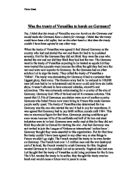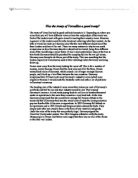Many Germans would argue that the treaty was aimed at completely destroying Germany’s economy, many people in Germany believed that the treaty would be based on President Wilson’s fourteen points which source A also talks about “For everyone still expected a peace settlement in accordance with Wilson’s fourteen points” when he treaty was actually signed there was anger throughout Germany and the treaty became known as a Diktat - as it was being forced on them and the Germans had no choice but to sign it. Many in Germany did not want the Treaty signed, but the representatives knew that they had no choice as Germany was incapable of restarting the war again. Germany was given two choices sign the treaty or be invaded. The loss of vital industrial territory was a severe blow to any attempts by Germany to rebuild her economy. Coal from the Saar and Upper Silesia in particular was a vital economic loss. Combined with the financial penalties linked to reparations, it seemed clear to Germany that the Allies wanted nothing else but to bankrupt her. Germany was also forbidden to unite with Austria to form one super state, in an attempt to keep her economic potential to a minimum.
There was anger throughout Germany when the terms were made public. The Treaty became known as a Very little territory was actually taken and mostly of what was given away was inhabited by people who considered themselves as Polish or French. Although the army was reduced, the generals were still there, and ready to rebuild when needed. Isn’t it hypocritical of Germany to complain and say they were tricked, when they had only taken the Fourteen Points seriously once they’d been beaten? They had also forced the harsh peace treaty of Brest-Litovsk on Russia in 1918 without worries. It could seem that, in their rage about having all the guilt on them, the Germans set out to make the treaty look much worse than it really was.
Clemenceau’s wishes for revenge had only been halfway fulfilled. He had wanted Germany broken up into small states and to pay much more in compensation for the destruction and death which had taken place in France. Of course, one must consider that he had to negotiate with Wilson, who was much more concerned with a ‘just peace’ and self-determination. The treaty weakened Germany more than Wilson had wanted, but the American president had been forced to negotiate in a position of weakness and to make far-reaching concessions to his allies in order to secure a peace treaty at all. He tried to conceal his failure to the American public by condoning the peace treaty as a just punishment for a bad criminal. Wilson first of all wanted to make sure that Germany would not succumb to Bolshevism; in the long run, he wished for an integration of republican Germany into a liberal community of nations. Germany could become a major economic power again, but not a military power. Wilson certainly didn’t accomplish everything he had hoped for, but that can be expected when you look at how much he wanted. No, secret treaties weren’t banned, not everyone was disarmed, and there wasn’t free movement of ships. Wilson was disappointed with some parts of the treaty, but one of his most important ideas, setting up a League of Nations, had been achieved even though the USA never joined. He signed the treaty because he had a lot of faith in the League and thought he would be able to accomplish whatever had been left out of the treaty later. Like Clemenceau, he didn’t get a lot of what he wanted, but the most important ideas were included in the treaty. Lloyd-George wanted Germany to be punished somewhat because of the public opinion at home, but he hadn’t wanted France to then become very powerful. The British empire didn’t suffer from the treaty, and although the colonies Britain got from Germany had to be looked after on behalf of the League of Nations, Lloyd-George still got a good deal because he hadn’t been asking for anything extreme and had wanted a compromise peace in the
beginning.
Source B which was written by a British historian in 1974 a long time after the war he says “it is no longer acceptable to blame the ultimate failure of the republic on the Treaty of Versailles”, which could be true to a certain extent the treaty did weaken Germany but in the 1920’s Germany began to recover even without its strong industrial areas and it could be fair to say that the Germans blew the whole treaty out of proportion. Source C, is written by a British historian in 1979 and makes the point that the treaty did not weaken Germany in an economic way as the Germans had moaned about but actually the treaty decreased political morality, disillusioning moderate men who would have supported the new republic, the fact that this source was written in 1979 means that this historian has had longer to look at more texts and find more evidence that could prove that one major factor in Germany’s weakness was not necessarily her economy because it was weak but because of political instability which made the government less effective and unable to restore the economy.
Source D is written by another British historian but in 2002, all three British historians comment by saying that the treaty is not as harsh as the Germans made out in 1918, but this is from a British perspective who were not living in Germany when the treaty took effect. The historian in source D believes” in some respects Germany was in relatively stronger position than 1914”, this could be argued both ways because in 1914 Germany was economically stronger but in 1918 all the empires around Germany had fallen so there were no major threats. All three British historians have different views as the sources written earlier may not have had as much information to research from.
I don’t believe that the Germans can blame every failure on the Treaty of Versailles, Germany’s economy was weakened by the reparations and the army was limited and the Weimar republic was not as good as it should have been but Germany was still a large country and had the potential to become economically strong again. It depends from which point of view you look at it though the Germans will always say the treaty weakened them which it did, but was probably blow out of proportion, if you look at it from a British point of view it doesn’t seem harsh enough and the Germans just wanted something to complain about. If the German government had not been so insecure and ineffective Germany may have been able to re-build itself a lot quicker. In the short run, the treaty significantly weakened Germany and gave the victors economic benefits and more power. In the long run, however, nothing spoke against a German recovery at least in economics. After the








